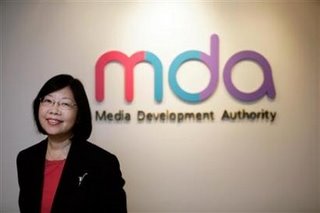SINGAPORE (Reuters) - Singapore's chief censor, Amy Chua, says she loves human interest films -- the kind where the humble protagonist succeeds against all odds.

"Erin Brockovich," "Billy Elliot" and "Million Dollar Baby" are among her favorites. "Cut," in which Singapore director Royston Tan settled a score with the censors for mutilating one of his films, is not.
 In "Cut," a film buff chases a frumpy censor as she wheels her cart down a supermarket aisle, and reels off a string of films which the bureaucrat had snipped -- from "Lost in Translation" to "Titanic." "Cut" itself, first shown in 2004, was not censored.
In "Cut," a film buff chases a frumpy censor as she wheels her cart down a supermarket aisle, and reels off a string of films which the bureaucrat had snipped -- from "Lost in Translation" to "Titanic." "Cut" itself, first shown in 2004, was not censored."This film misrepresents the Board of Film Censors (BFC) because we are portrayed as being "scissors-happy" when this is far from the truth," Chua, the BFC's chairwoman, told Reuters. "I'd prefer if we are viewed as classifiers rather than censors.
The film won a following among cineastes in the city-state, where an outing to the cinema often used to be memorable not so much for the film itself as for the jerky edits excising bare breasts, sex scenes and obscenities.
"'Cut' is a plea from the Singapore film industry," said Tan.
However, Singapore's long-standing stranglehold over content is being eroded thanks to technology, now that many films can be downloaded for free over the Internet.
Two years ago, following a review of censorship practices, Singapore revised its classification of films and videos, giving a wider range of ratings. Now there is a category for viewers over 18 years old, in addition to existing ones for 16-plus and 21-plus. Now there is less need to cut "adult" scenes as a film can be rated for a mature audience.
NUDES AND PRUDES
"Censorship is a reflection of a country's social norms and values," said Chua, a demure woman in her 50s who is in charge of content for film, video, broadcast and publications at the information ministry's Media Development Authority (MDA).
"In Scandinavia full nudity (on screen) might not be a problem, but if we had full nudity, parents would complain."
The censors' vetting of videos brought into the country for personal use may be eliminated next, Chua said.
The addition of the category for over 18s gave viewers more choice while protecting younger audiences, she said. As a result, films that deal with controversial issues -- at least for Singapore -- can be seen in cinemas.
The city-state officially outlaws gay sex.
Wong Kar-Wai's gay love story "Happy Together" was shown first at a film festival but was not allowed for commercial distribution under the old rating system.
But award-winning "Brokeback Mountain," based on Annie Proulx's story about two gay cowboys, was shown uncut this year.
"It didn't really glorify homosexuality as a lifestyle, and scenes were tastefully shot," said Chua who, as head of the BFC, reviews controversial films such as "Brokeback Mountain" and "Kinsey," which is based on the life of sex researcher Alfred Kinsey.
But Tan, the Singaporean director, ran afoul of censors with his film about local youth gangs: "15" had 27 cuts for offensive language, violence and gang chants which the authorities feared might incite violence and glorify gang culture.
SEX, VIOLENCE AND POLITICS
Singapore's sensitivities extend beyond sex, violence and swear words to political, racial and religious issues, reflecting more than four decades of one-party rule and a population mix of ethnic Chinese, Malays and Indians.
The People's Action Party, which has dominated politics since independence in 1965, has repeatedly used defamation lawsuits against opposition politicians. In the run-up to the May 6 general election, the government warned Singaporeans against posting political commentary in blogs and podcasts.
Last year, Singaporean film director Martyn See had to withdraw his documentary on opposition politician Chee Soon Juan from a film festival. See was then questioned by police, who confiscated copies of the film as well as his film equipment.
"Political subjects can be treated in a film. It's how you treat it, whether it's balanced," said Chua who spent most of her career at Singapore's state broadcaster making documentaries and managing programing.
The Ministry of Information, Communications and the Arts (MICA) said last year that "party political films are disallowed because they are an undesirable medium for political debate in Singapore." MICA said "the ban here is only on films which deal with political issues in a partisan manner."
The See saga prompted a member of the public, Kelvin Lau Jit Hwee, to write to a local newspaper pointing out that the state-owned broadcaster had screened a series about government leaders: Could they also have violated regulations and face investigation by police, he asked.
The government said the series did not breach the Films Act "as the discussions were conducted in a non-partisan manner."
"Things have improved, but it's often a case of two steps forward, one step back," said poet and writer Felix Cheong.
3 comments:
Oh come on. The govt is only cutting films to protect Singaporeans from harmful nudity and sex. Such scenes are damaging to the mind and may lead to undesirable behavior. We should not risk it.
http://singaporemind.blogspot.com
Come and drop us a line at
www.eatshortfilms.com
singapore censors stupidly...though not as stupidly as malaysia! i dont see any point in censoring life of brian!
Post a Comment